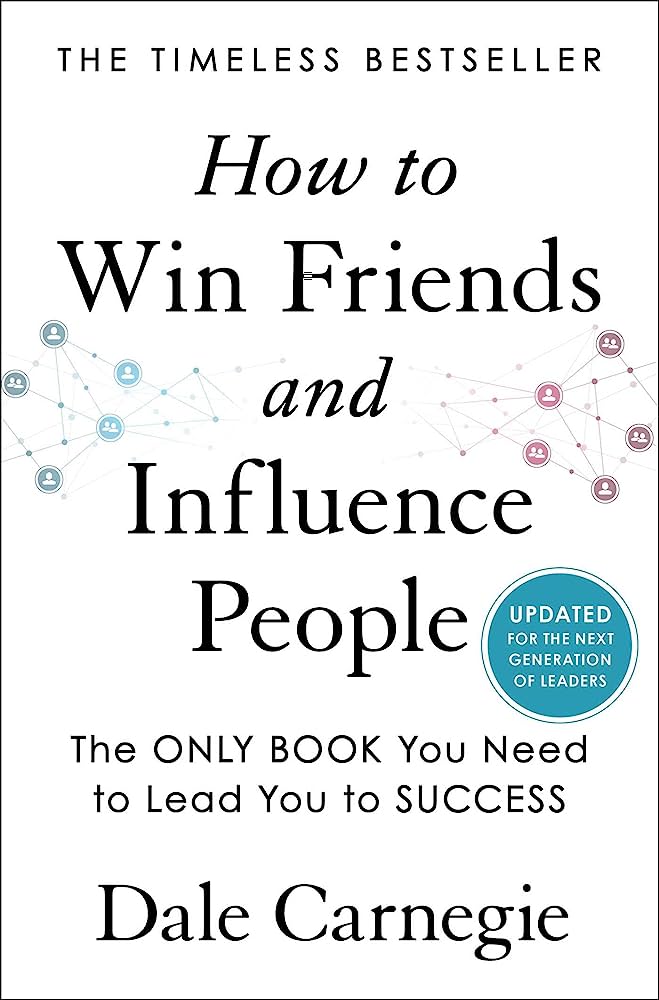In a world filled with constant communication and an ever-growing network of relationships, the ability to connect with others becomes an invaluable skill. How we navigate these social interactions can shape the outcomes of our personal and professional lives. Dale Carnegie, a pioneer in the realm of self-improvement, understood this fundamental truth. His timeless masterpiece, “How to Win Friends and Influence People,” continues to inspire individuals across generations, offering profound insights into the art of human connection.
The book is divided into four sections, each addressing a key aspect of human interaction. Considering I am writing a book review, I will only highlight the techniques that I personally found interesting.
Luckily for you, this time I will not be exploring the themes of the book.
Let’s dive right into it.
- Smile. It sounds deceptively simple, doesn’t it? Yet, I came to the realization that I had forgotten its power in my day-to-day life. Surprisingly, my circle of friends would often express their initial negative impressions of me, which bewildered me. I know I am not a mean person, but somehow that was the image I projected. It was during this time that my mom’s words resurfaced in my mind: “If you smile, the world will smile back.” Though I initially dismissed it as a cliché, I decided to put her wisdom to the test.
One day, as I made my way to university, I consciously smiled at fellow passengers on the train. During lunch, I offered a warm smile to my waiter. And as the day progressed, I continued to share smiles with strangers I encountered. To my astonishment, every single person I smiled at returned the gesture. That night, as I lay in bed, I felt an undeniable sense of happiness. Not only did my smiles evoke reciprocation, but the simple act of smiling every day transformed my own demeanor, making me happier and more approachable.
Through this experience, I learned that a smile holds a profound impact on conversations. It creates a welcoming and inviting atmosphere for those around me. What I once perceived as a mere social nicety turned out to be a powerful tool in fostering connections and making others feel comfortable in my presence. Smiling became a habit, an integral part of my daily interactions. It became an integral part of who I am, radiating positivity and drawing people closer. So, I invite you to embrace the power of a smile and experience the remarkable impact it can have on both your interactions and your own sense of well-being.
- Showing genuine interest in people is an essential skill that can enrich our interactions and lead to deeper connections. It’s important to recognize that if ever you find a conversation boring, the responsibility lies with you, not the other person. Feeling bored in a conversation can stem from preconceived judgments, stereotypes, or a focus on impressing or appeasing others.

Excerpt from Stephen Covey’s The 7 Habits of Highly Effective People
So, how can we find genuine interest in the people we meet? True connection and positive relationships can only be built through active listening. Seek first to understand and then to be understood.

Now, you may be wondering what’s the point of socializing with someone you find boring? The truth is, that question limits you from the potential of encountering extraordinary people. Some of the most enlightening conversations I’ve had have been with individuals who are polar opposites of me. Their perspectives, opinions, and experiences have broadened my horizons and fostered empathy within me.
In essence, it’s important to acknowledge that opening ourselves to conversations with diverse individuals, even if they initially seem uninteresting, presents opportunities for intellectual and personal growth. By overcoming our state of boredom, we allow ourselves to learn and develop in ways we never thought possible. So, let’s break free from the constraints of boredom and embrace the vast array of experiences and perspectives that await us. In doing so, we will enrich our lives and forge meaningful connections that transcend surface-level interactions.
Live, Laugh, Love!

On a more serious note, while Dale Carnegie’s “How to Win Friends and Influence People” has enjoyed immense popularity over the years, it is not without its fair share of criticisms. The following are my personal critiques:
- Ignoring Authenticity. My initial impression of the book was regarding its emphasis on pleasing others. It felt like Carnegie listed cheap and quick life hacks to gain from others. For example, in his book, Carnegie heavily emphasizes the importance of remembering someone’s name: A person’s name is to that person the sweetest and most important sound in any language.
While remembering someone’s name certainly can make them feel valued, I believe focusing solely on tactics like this one can come across as insincere if not accompanied by a genuine interest in the person as an individual. Friendships are not built through manipulation or personal gain. Genuine connections should be built on trust, honesty, and a sincere desire to understand and help others.
- Lack of Ethical Considerations.
“The only way on earth to influence other people is to talk about what they want and show them how to get it.”
Dale Carnegie
The absence of ethical guidance in this book got me to raise some concerns about the potential misuse of Carnegie’s techniques for personal gain, without regard for the well-being of others. A person’s intentions matter the most when it comes to relationship building. Furthermore, ethical considerations are essential when it comes to influencing individuals, as relationships built on manipulation and self-serving motives are unlikely to be sustainable.
I wish Carnegie emphasized both points to the reader as his techniques left me with a disingenuous impression.



